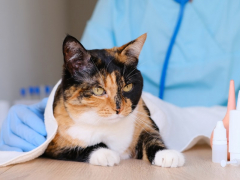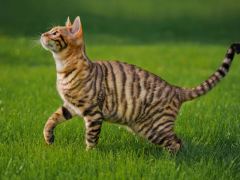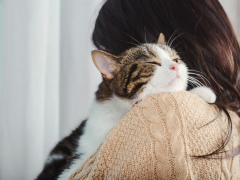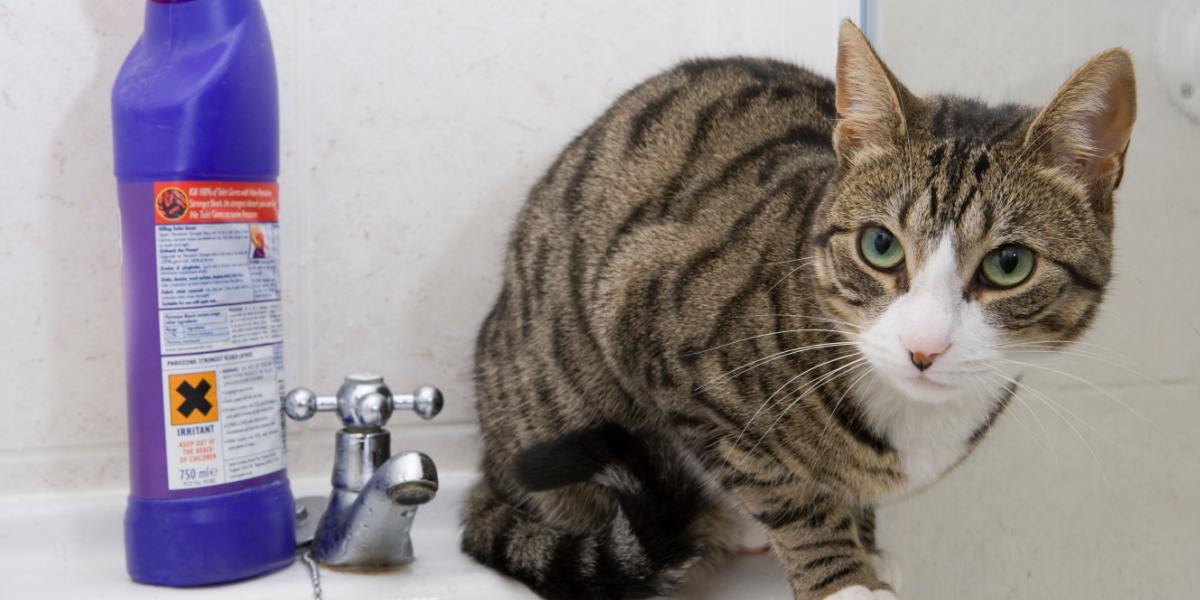
Most cat owners have, at some point, likely encountered their cat showing interest in bleach cleaning products. Cats often rub themselves against, sniff, purr at, and roll on anything that has been cleaned with bleach.
Cats are commonly attracted to bleach products in the household, rubbing themselves against areas cleaned by bleach, sniffing and rolling around. It is theorized that bleach has a similar effect on cats as pheromones do. Bleach is toxic to cats if ingested or inhaled in large amounts. It is important to keep your cat away from any cleaning products, even if they may want to get close to them.Key Takeaways
Cats that do this likely think that bleach smells like other cat urine. This may seem a little crazy at first, but if we break it down, it does make sense. A cat’s urine releases chemical compounds as it decomposes, which smells similar to bleach.
This means that to cats, bleach may smell similar to other cats. Exposure to bleach appears to cause a hormonal reaction in cats, where they act as if under the influence of hormones and pheromones. Let’s take a closer look at this feline quirk.
Types of Bleach
There are many different types of bleach cleaners commonly used in our households. Bleach solution often contains chlorine. Different bleach products will contain varying amounts of chlorine, some with very high amounts, and others with low amounts or none at all.
The higher the chlorine concentration, the more corrosive the bleach is. It is worth checking out the concentration of chlorine in the bleach before deciding to use the product in your home. If you are unsure, you can speak to your vet. Some products also contain ammonia, which cats have a reaction to as well.
Why Are Cats Attracted to Bleach?
Cats function by detecting scents and other chemical compounds in their environment that give them information about their surroundings. They usually hunt alone, so they rely on their senses to allow them to locate their prey and also to stay away from potential predators.
Cats have a brilliant sense of smell. It appears that bleach smells interesting to cats. Some owners report that cats react in a very positive way when they smell bleach.
Excitedly sniffing and rolling around in the area where bleach has been used typically demonstrates approval of the smell. When cats press themselves up against the surface that the bleach has been used on and rub themselves on it, they are trying to get closer to it to and get a better sniff.
However, another school of thought is that cats displaying this behavior are trying to rub their scent over the new bleach smell to claim it as their own. In this way, cats mark the place with the strange smell as their territory, possibly because they feel threatened.
The exact reason that cats are attracted to bleach has not been scientifically proven, but there are a few good theories. Let’s explore them.
1. Attraction to Chlorine
Pheromones are special chemical messengers that are secreted or excreted by cats. They trigger a social response in other cats. Cats use pheromones every day to gain important information about their environment. There are pheromones that give cats messages about territory markings, mating, and bonding.
Something in the chemical makeup of bleach attracts cats. One of the components of bleach is, as stated above, chlorine. According to this theory, the smell of chlorine may have the same effect that pheromones have on cats when they smell it, suggesting it may affect their brain chemistry. This is why they appear to be attracted to the smell in the same way they would be to a potential mate or a familiar cat.
2. A Threatening Smell
As the chlorine in bleach can release pheromones, your cat can react to these chemicals. If they have never smelled this smell before, they may identify it as a threat or the smell of an intruder.
You may see your cat repeatedly going over to the bleach to smell it. They may roll around and rub themselves against the area to try and rub their own scent over the pheromones to mark this specific area as their own territory. Cats do this to warn other cats away and replace the new scent with their own.
3. Drug Interactions
Another theory regarding cats in bleach, is that chlorine seems to have a strange effect on cats that is similar to catnip. Some cat owners believe that chlorine is capable of triggering the happy receptors in your cat’s brain just as catnip does.
After watching cats react to Nepetalactone, which is one of the chemicals present in catnip, it’s easy to see that a cat’s reaction to nepetalactone mirrors that of their reaction to bleach or chlorine. This means that the bleach has “drug-like” effect on the cat.
Should I Prevent My Cat From Sniffing Bleach?
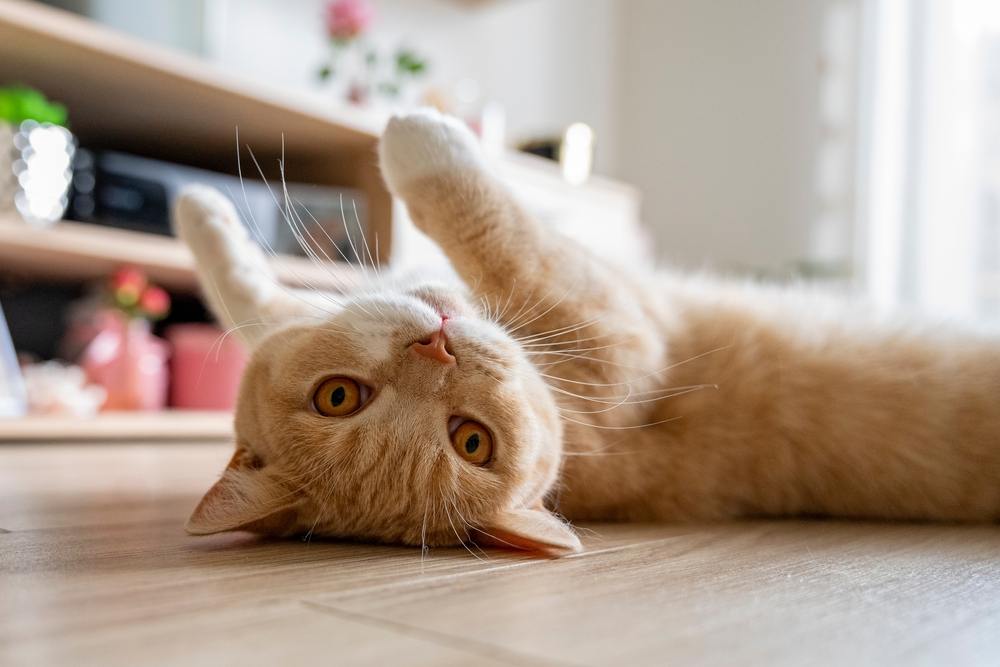
Cats will react to the smell of chlorine in the same way they react to pheromones or catnip.
Bleach is a known irritant. It is a strong, harsh chemical cleaning product and can be harmful to both humans and cats. If your cat is constantly in contact with the product or inhales it on a regular basis, this will have a detrimental effect on your cat’s health. An occasional sniff of bleach after it has been used to clean somewhere, and then rinsed away, is unlikely to cause harm.
If you need to clean with bleach and you know your cat will be attracted to it, always ensure that you use diluted bleach so that it is not as concentrated and strong. If you are worried about your cat licking or ingesting bleach after you have used it as a cleaning product, keep your cat in a different room or area while you are cleaning. A switch to pet-friendly cleaning agents that do not have any bleach in them is always a safe alternative.
Why Don’t Some Cats Like Bleach?
Many cats will go crazy for the smell of bleach. However, not all cats will react like this. Some cats won’t react at all. Other cats are actively repulsed by the smell and go out of their way to avoid it. It is thought that there are generic components that affect whether a cat reacts or not to bleach.
Some breeds of cats are more prone to reacting to bleach and other chemicals than other breeds. Ragdoll cats seem to react to bleach more than other cats. The exact reason behind this is unknown.
Tips For Keeping Your Cat Away From Bleach
If you have cats and want to still use bleach cleaning products, there are a few extra precautions you can take to keep your cat safe in your home.
1. Never Leave Cleaning Products Out
When using cleaning products, never leave them unattended, especially when the lids are off them. If you are moving between rooms, take the products with you or store them away. Never leave mop buckets with any solution unattended and pour it out when you have finished. If you store a lot of bleach in your house, ensure it is always locked away from cats.
2. Keep the Lid Closed on the Toilet
The toilet is one of the easiest places for your cat to access bleach. They can jump up with ease and poke their head into the bowl, getting immediate access to the bleach products. Cats may try to lick the bleach from the rim if the toilet has recently been cleaned, so keep the toilet lid shut at all times.
3. Dilute Your Bleach
It is always good practice to dilute your bleach when cleaning. This reduces the amount of fumes that humans and animals inhale when in close proximity. Standard household bleaches have a 5-6% hypochlorite content.
This is very high and if ingested, it can cause serious health issues including vomiting, diarrhea, ulceration of the mouth, sore throat, excessive drooling, difficulty breathing, seizures, and stomach pain. It can also damage a cat’s paws if they walk over a surface that has been cleaned with highly concentrated bleach.
A good ratio for dilution is 1:32 of bleach to solvent. Always rinse surfaces and dry them thoroughly after using bleach if your cat has access to them.
Cats and Bleach
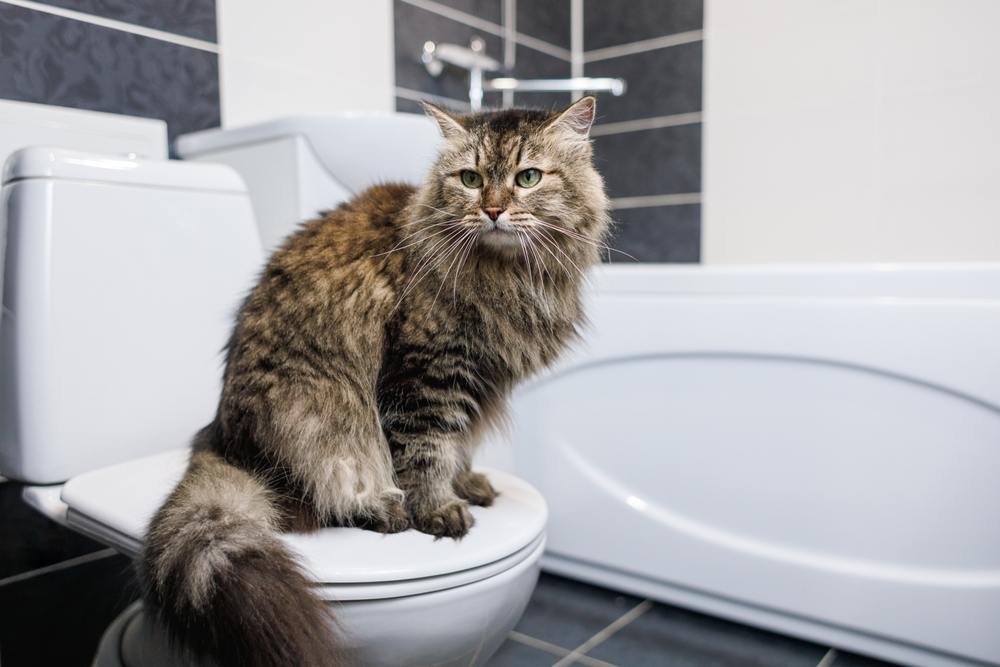
Keep your toilet lid shut to discourage a cat from licking a recently bleached toilet seat.
Cats seem to be attracted to bleach due to the fact it contains chlorine. Cats commonly react to chlorine as they would to pheromones or catnip in their environment. They may approve of the scent or find it threatening. Other cats don’t care about bleach at all.
Each individual cat will react slightly differently to chemicals. They all have different tolerances and thresholds so the reaction you see will be unique to your cat.
You must never allow your cat to lick or ingest bleach because it is highly toxic. If you think your cat may have ingested bleach, contact the ASPCA Animal Poison Control Center at 888-426-4435. You can also call The Pet Poison Helpline phone number at 855-764-7661.
Also Read: Poisoning in Cats: Causes, Symptoms, and Treatment
Frequently Asked Questions
Is bleach harmful to cats?
Bleach is a toxic substance used for cleaning and can be harmful to both humans and cats if its fumes are inhaled or if it is ingested. Diluting bleach makes it safer to use, but it should never be left unattended where a curious cat can get a hold of it. If you are concerned about how safe it is to use bleach in your home, there are plenty of pet-friendly cleaning products available on the market.
What happens in a cat licks bleach?
Cats should never be allowed to ingest bleach. Signs that your cat has gotten into bleach include vomiting, diarrhea, ulceration of the mouth, sore throat, excessive drooling, difficulty breathing, seizures, and stomach pain. If your cat is displaying symptoms of poisoning, immediately call the ASPCA Animal Poison Control Center at 888-426-4435.
Does bleach deter cats from peeing?
Quite the contrary. Cats may mistake the smell of the chlorine present in bleach for cat urine, and be tempted to mark the territory as their own with their own pee.
-
https://cats.com/cat-pheromones
-
https://www.ncbi.nlm.nih.gov/books/NBK441921/
-
https: //cats.com/territorial-marking-and-spraying-behavior-in-cats




